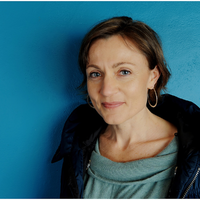Contributor: Morgan Motzel
On Work and Life, Erin Owen, as guest host for Stew Friedman, spoke with Katrina Alcorn, author of Maxed Out: American Moms on the Brink. Following are excerpts of Alcorn’s conversation with Owen:
Erin Owen: How we can have work that is compatible with having a healthy, enjoyable personal life?
 Katrina Alcorn: Businesses have an incredible opportunity to create desperately needed change in the American workplace. Employers need to start looking at how to empower their employees with more autonomy. I know from having been a manager that this idea can be really scary. You might feel, for example, as though your job is to make sure that everyone is in their seat and working hard. But that’s not necessarily the best way to go about it. Just seeing someone present in the office doesn’t mean we’re getting the most out of our employees, nor does babysitting them mean we’re being good managers. One interesting new management strategy is the high-performance or results-oriented work environment. The idea is that you can empower employees – whether they are knowledge workers or people who work on a factory floor – to make the best decisions and do the best job that they can. In this model, employees have control, instead of the boss is telling everyone what to do. When people are empowered and have real responsibility, they find their work is a lot more meaningful. It’s also great for morale because no grown-up wants to be babysat.
Katrina Alcorn: Businesses have an incredible opportunity to create desperately needed change in the American workplace. Employers need to start looking at how to empower their employees with more autonomy. I know from having been a manager that this idea can be really scary. You might feel, for example, as though your job is to make sure that everyone is in their seat and working hard. But that’s not necessarily the best way to go about it. Just seeing someone present in the office doesn’t mean we’re getting the most out of our employees, nor does babysitting them mean we’re being good managers. One interesting new management strategy is the high-performance or results-oriented work environment. The idea is that you can empower employees – whether they are knowledge workers or people who work on a factory floor – to make the best decisions and do the best job that they can. In this model, employees have control, instead of the boss is telling everyone what to do. When people are empowered and have real responsibility, they find their work is a lot more meaningful. It’s also great for morale because no grown-up wants to be babysat.
EO: This implies a culture shift that affects every level of an organization and gives employees more responsibility to make decisions.
KA: That’s right. And the other side of freedom is holding them accountable. It’s not just about showing up. It’s not about how many sick days you took. It’s about holding yourself accountable to doing the best job you can do.
EO: Are you suggesting that having a more meaningful work will translate to having a more healthy and enjoyable personal life?
KA: It’s not as though we become one person when we step into the office and a different person when we go home, although sometimes it may feel that way. We are one person with one life, no matter what we’re doing. Part of our growth involves bringing our humanity to everything we do and not turning it off when we’re at the office. Our humanity makes us good at our jobs.
I started in a managerial role after my first child was born. At the time, I was just learning how to manage people, and I started noticing all the ways that being a mother actually made me a better manager of adults. It wasn’t that I was mothering them, but I found that being a mother taught me to put my ego in check. Being a mother also helped me learn how to rise above conflict and to be the one to help people come to resolution without holding grudges. Things about motherhood translate back to your work in wonderful ways.
EO: That’s just one more reason for employers to want to bring parents back into the work force after a parental leave.
KA: That’s right. Another important thing for employers to think about is productivity. Americans now work the longest hours and have least time off compared to workers in any other country. We think this is part of what makes us so productive, but the research is showing that – while it may be counter-intuitive – working less can actually make us more productive. When we consistently work long hours, for example, we actually can go into what is called a “negative productivity cycle.” Employees are so overworked that they are sitting in meetings but it’s as if they’re not even there, or at least that their brain isn’t. People are making decisions, but they are often bad decisions because they’re just so exhausted. Having employees working really long hours doesn’t necessarily mean that they’re more committed or that they’re doing a good job.
EO: You’re saying that, as a manger, I need to empower my employees to make their own decisions. Next, they need to work less. Isn’t this a danger to economic performance?
KA: Research shows that long hours kill productivity, profits, and people. The author of a summary of cited 150 years of research, including studies spanning multiple industries over decades, which showed that when you work more than 50 hours per week, things start to go wrong.
EO: We talked about ways to cultivate more meaningful work so that it can be compatible with a healthier personal life, from the employers’ perspective. How about from the employees’ point of view? What can we do as individuals?
KA: One of the things I’ve been told I need to work on is learning to say no and how to set good boundaries. I know there are tons of people like me who are also people-pleasers and who also find it hard to say no to people. I want to say yes. It’s a practice that I have to constantly keep in mind. For example, I just got an email today asking parents to chaperone a field trip at my kids’ school. I try to chaperone lots of field trips because that’s one way in which I can really help out. Plus my kids love it and I really enjoy it. This time I ignored it because I have a meeting that day. But then the school sent out an email saying, “please, please, please, we’re going to have to cancel it!” I had this feeling that I just have to say yes. But then I thought about how impossible my week was going to be if I took a half-day out to do this. Sometimes I do have to say no, and it doesn’t always feel good. And the “no” extends to work issues too, not just life issues.
EO: You really need to be clear about what’s best for you, what helps you be healthier, more present, and more focused in all parts of life.
KA: Exactly. I think what we need to do is start really valuing our physical health and our mental health in a new way. Everyone feels stress, and that’s a normal part of life, but we all know when we’re crossing the line or when it’s just too much. The truth is that no one is going to advocate for you, especially in the workplace, but even in your personal life too. Only you are going to do that, and if you don’t do it no one will. We have an obligation to take ourselves seriously and really look at what we need in order to make sure our life is healthy, enjoyable, and meaningful.
Katrina Alcorn is the author of Maxed Out: American Moms on the Brink. She is also a frequent contributor to the Huffington Post as well as her personal blog “Working Moms Break” which can be found at www.workingmomsbreak.com. To learn more about Katrina, visit her website at www.kalcorn.com.
Tune in to Work and Life next Tuesday, February 18 at 7 PM Eastern on Sirius XM Channel 111 for conversation with the Wharton Total Leadership Mentor corps on that work for improving performance in all parts of life. Visit Work and Life for a full schedule of future guests.
About the Author
 Morgan Motzel is an undergraduate junior in the Huntsman Program in International Studies and Business at Penn focusing on Management and Latin America.
Morgan Motzel is an undergraduate junior in the Huntsman Program in International Studies and Business at Penn focusing on Management and Latin America.
Leave a Reply